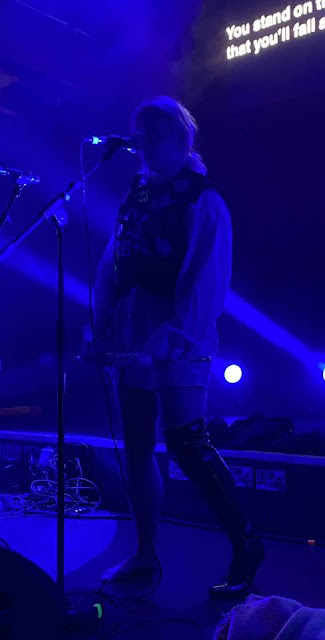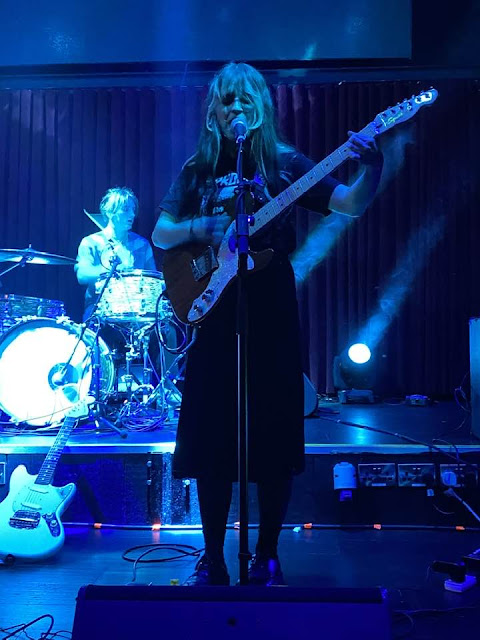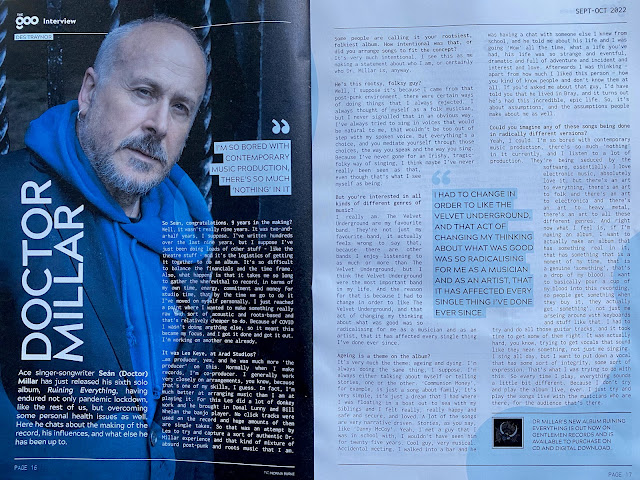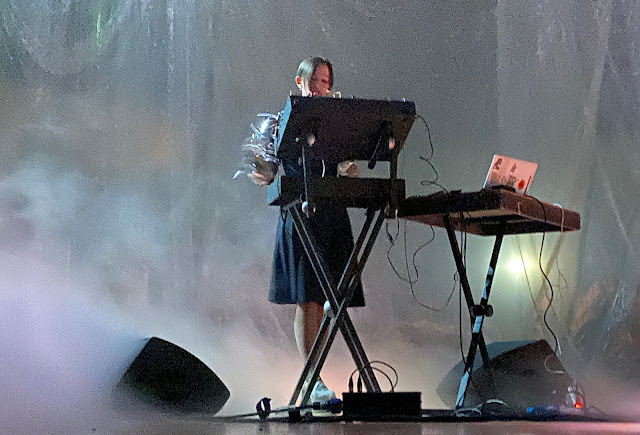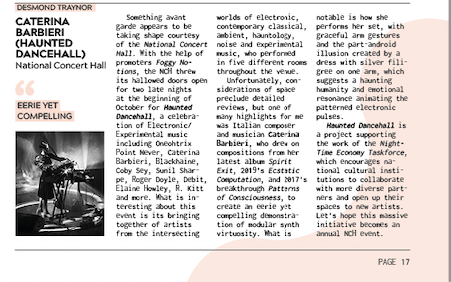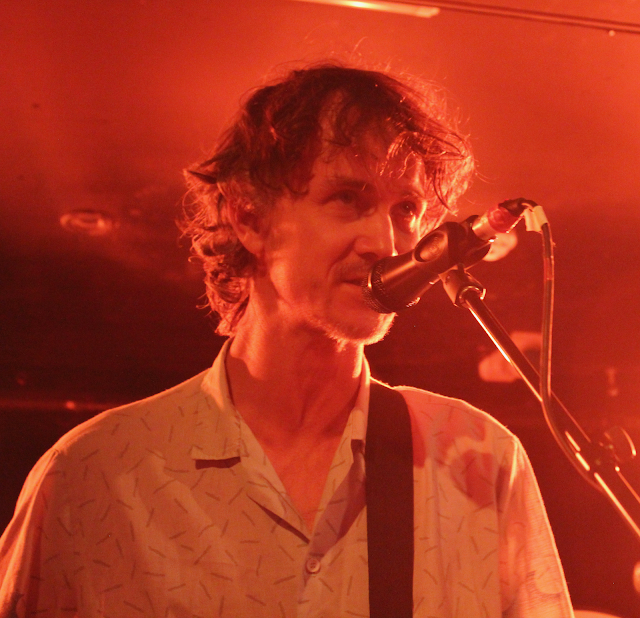Saturday, 17 December 2022
Pussy Riot: Riot Days / Cruel Sister - Opium Rooms - 15/11/2022
Tuesday, 6 December 2022
Doctor Millar - Interview - September 2022
Ace singer-songwriter Seán (Doctor) Millar has just released his sixth solo album, Ruining Everything, having endured not only pandemic lockdown, like the rest of us, but overcoming some personal health issues as well. Here he chats about the making of the record, his influences, and what else he has been up to.
So Seán, congratulations. Nine years in the making?
Well, it wasn’t really nine years. It was it was two-and-a-half years, I suppose. I mean, I started demoing songs, and I’ve got a pile of songs ready to go. I would say I’ve got at least thirty songs that I’m happy with putting on a record. I mean, I’ve written hundreds over the last nine years, but I suppose I’ve just been doing loads of other stuff, the theatre stuff, and it’s the logistics of getting it together to do an album. It’s so difficult to balance the financials, and the time frame. Also, what happens is that it takes me so long to gather the wherewithal to record, in terms of my own time, energy, commitment, and money for studio time, that by the time we go to do it I’ve moved on myself personally. But with this one what was really good was I just I reached a point where I wanted to make something really raw and sort of acoustic and roots-based, and that’s relatively cheaper to do. And because of COVID I wasn’t doing anything else, so it meant this became my focus, and I got it done and got it out. I’m working on another one already.
It was Les Keye, at Arad Studios?
…as producer, yes, and he was much more ‘the producer’ on this. Like, normally when I make records, I’m co-producer. I generally work very closely on arrangements, you know, because that’s one of my skills, I guess. In fact, I’m much better at arranging music than I am at playing it. For this Les did a lot of donkey work, and he brought in Donal Lunny, and Bill Whelan the banjo player. There was a lot of his methods, no click tracks were used on the record, and huge amounts of them are single takes. So that was an attempt by Les to try and capture a sort of authentic Dr. Millar experience, and that kind of mixture of absurd post-punk and roots music that I am.
Some people are calling it your rootsiest, folkiest album. How intentional was that, or did you arrange songs to fit the concept?
It’s very much intentional. I see this as me making a statement about who I am, or certainly who Dr. Millar is, anyway.
He’s this rootsy, folksy guy?
Well, I suppose it’s because I came from that post-punk environment, there were certain ways of doing things that I always rejected. I always thought of myself as folk musician, but I never signalled that in an obvious way. I’ve always tried to sing in voices that would be natural to me, that wouldn't be too out of step with my spoken voice. But everything’s a choice, and you mediate yourself through those choices, the way you speak and the way you sing. Because I’ve never gone for an Irishy, tragic-folky way of singing, I think maybe I’ve never been really seen as that, even though that’s what I see myself as being.
But you’re interested in all kinds of different genres of music.
Personally, I really am. I mean, The Velvet Underground are my favourite band. They’re not just my favourite band, it actually feels wrong to say that, because there are other bands I enjoy listening to as much or more than The Velvet Underground. But I think The Velvet Underground were the most important band in my life. And the reason for that is because I had to change in order to like The Velvet Underground, and that act of changing my thinking about what was good was so radicalising for me as a musician, and as an artist, that it has affected every single thing I’ve done ever since.
Ageing is a theme on the album?
It’s very much the theme: ageing and dying. I’m always doing the same thing, I suppose. I’m always either talking about myself or telling stories, one or the other. ‘Communion Money’, for example, is just a song about family. It’s very simple, it’s just a dream that I had where I was floating in a boat out to sea with my siblings, and I felt really, really happy and safe and secure, and loved.
A lot of the songs are very narrative driven. Stories, as you say, like ‘Danny McCoy’.
Yeah, I met a guy that I was in school with, I wouldn't have seen him for twenty-five years. Cool guy, very musical. Accidental meeting, I walked into a bar and he was having a chat with someone else I knew from school, and he told me about his life and I was going ‘Wow’ all the time, what a life you’ve had, his life was so strange and eventful, dramatic and full of adventure and incident and interest and love. Afterwards I was thinking – apart from how much I liked this person – how you kind of know people and don’t know them at all. If you’d asked me about that guy, I’d have told you that he lived in Bray, and it turns out he’s had this incredible epic life. So, it’s about assumptions, and the assumptions people make about me as well.
Could you could imagine any of these songs being done in radically different versions?
Yeah, I could. I suppose what it is, is I’m so bored with contemporary music production. If you work at it, especially my other job in theatre, I get to explore different styles. But there’s so much ‘nothing’ in contemporary music production, and I listen to a lot of production. They’re being seduced by the software, essentially. I mean, I love electronic music, absolutely love it, but there’s an art to everything, there’s an art to folk and there’s an art to electronica and there’s an art to heavy metal, there’s an art to all these different genres. And right now what I feel is, if I’m making an album, I want to actually make an album that has something real in it, that has something that is a moment of my time, that is a genuine ‘something’, that’s a drop of my blood. I want to basically pour a cup of my fucking blood into this recording, so people get something when they buy it, they actually get ‘some thing’, not just me arseing around with keyboards and stuff like that. I had to try and do all those guitar tracks, and it took time to get some of them right. It was actually hard, you know, trying to get vocals that sound like they mean something, not just me singing. I mean, I sing all day, but a vocal that has some sort of integrity, some sort of expression. That’s what I was trying to do with this. So every time I play, everything sounds a little bit different. Because I don’t try and play the album live, ever. I just try and play the songs live with the musicians who are there, for the audience that’s there.
Garret “Jacknife” Lee - Telefís - Interview - August 2022
Following the death of revered Irish singer-songwriter Cathal Coughlan on May 18th this year comes the release of the second album by Telefís, his groundbreaking collaboration with world-renowned producer Garret “Jacknife” Lee. The pair had completed “a Dó” earlier in 2022, with an album release planned for September. With the approval of Cathal’s family the album will now be available on October 7th. Des Traynor spent an hour-and-a-half on Zoom to Garret in L.A. recently, where the Dubliner now lives and works. From a wide-ranging, generous chat, here are the Telefísed highlights.
You would have known Cathal when you were living in England in the 90s?
No, I met Cathal once. I didn't remember it. In The Underworld in Camden in probably 1992. He remembers it. When we were talking before doing the album, I said I haven’t seen you since Ireland. And he said, ‘No, we met.’ We were all taking a lot of drink at the time. So I didn't remember Cathal. Once he said it, I vaguely remembered seeing him. I think he had just played a gig. I went up to him, and we talked for a while.
But you knew him in Dublin in the ’80s.
Yeah, we played gigs together.
You reconnected through Luke Haines?
I was mixing a record for Luke. And he was with Cathal one day. And he said, ‘I’m with a friend of yours.’ So I said, ‘Introduce me.’ And Cathal said, ‘I hear you did a record with Luke, and he likes it, which is a first, ’cos he doesn’t like anything.’ And then I said, ‘Well, should we make a record?’ And he said, ‘Sure.’
Cathal said somewhere that it was beneficial that you were in different places, because you were out of each other’s way. But was it strange being on opposite sides of the world, bouncing audio files back and forth?
No, I've worked this way for quite a while, since COVID, with different artists. You know, if an artist is on tour, they can’t come here. And then a lot of times people are doing extra tracks, or need a single edit done or are just recording a single. So I've been working this way anyway. And obviously working with U2, I can’t go over there every other weekend just to record a vocal, so I decided that a good way to be working was just to get my own space. And it means that I can work on a number of things in the one day. If I have an artist here it can get a bit ‘intense’. So for Telefís it was it was easier for both of us because I think Cathal had been working by himself for a long time. And I know from my own history, when you’re doing everything, it’s a lot of pressure and you don’t know when to let things go. So, Cathal doing music, and then the vocal production, the engineering that he had been doing, just took him a long time. So by me sending tracks, I think it was more fun for him. And also, you were coming at it from a different perspective. A lot of Cathal’s work is based on the drama in it. Aside from the lyric, it’s chord based, so we’re motoring along the verse, then we’ll have this chord and then it will force him to write from another perspective, or lyrically, there has been an event, or something. So without those things, he was forced to come at things in a different way. And I think he liked the challenge of it. So I’d send him a track that was mostly finished. And then he would send an idea back, and then I’d be working on that, and I’d send it back to him with his vocals manipulated in some way. Up to that point, a lot of the vocal manipulation had seemed gratuitous or gimmicky to him, when it had been done on other records, but this didn’t feel that way. So I think it excited him. So it was easier for him. And it was easier for me to work on music when somebody’s not here.
Like, I was doing a record with Open Mike Eagle, who’s a very respected rapper in LA. He asked me to work on his record. And I tried stuff out on his vocals, that if he was here, he wouldn’t have licenced it, because it can be time consuming. It can seem like a waste of time to try this dumb experiment. Also, he may not have liked it. But in context, it kind of works. And also, the way Cathal wrote his words, it took time. So had we been together, it would have been more musical – but this way, he was just given a set and asked to fill it, and it wouldn’t be a set that he would have designed himself. So there was a kind of thrill to it for him. I didn’t really get involved with words. He says I did – I mean, I would say things, or I’d sing something and then send it back, and I’d have crappy words – that I would have been happy with – but obviously, he’d say ‘I can’t sing that’, and he was right.
Did you know Cathal was seriously ill during the making of the first album, and how did you deal with it subsequently?
Cathal’s dying was always a part of these songs. Not literally, but his reflections and explorations of where he came from examined from this perspective. After his death we could have waited to release the album, and I accepted that we might have to, but now I just want to celebrate Cathal. I want people to know that he was active and working up to the last few days of his life. We were working on more Telefís - writing and planning. I know that might have been something to just take his mind off his illness, but that was the way he dealt with the situation and I want to honour that. There are many layers to Cathal Coughlan. The mischief, the tenderness, and the profound melancholy. Such a sweet man. It’s all here, and it’s some of his best work. Writing these songs during his illness, knowing what lay ahead of him, shows his commitment to words and ideas. It’s his life.
Katie Kim - Interview - August 2022
‘Unassuming’ is an adjective that, at first nod, one might be tempted to reach for when trying to describe Katie Kim and her music, as they both tend to partake of tentativeness, reticence and nuance. But just as the musician’s shyness can shield a quietly stubborn commitment to her craft, so too her dreamy work contains relentlessly emotional swells with the power to leave the listener fundamentally changed, as is evident on her new release, Hour of the Ox. As if to exemplify this notion, she tells me that the title comes from a traditional Japanese cursing ritual, Ushi-no-Toki-Mairi, or ‘ox-hour shrine-visit’, so-called because it is conducted during the hours of the Ox (between 1 and 3am – a good time for listening to ethereal music). The practitioner – typically a scorned woman – hammers nails through a straw effigy of the victim impaling it to a sacred tree. The ritual must be repeated for seven consecutive nights, after which the curse supposedly causes the target’s death – but being witnessed in the act nullifies the spell. So don’t go taking anything for granted here.
So, how are you?
I'm good. I'm gonna say straight off the bat that this is probably the first in-person interview I’ve had in a good few years. So excuse my social anxiety and word soup – if that happens.
No problem. I think a lot of people feel like that after the pandemic.
I had to go to this event in Universal a few days ago. I was just meeting someone for the first time, and it was one of the most difficult conversations to keep going. Because it’s like, how do I converse with people? Again.
How did you get started in music? In Waterford, when you were in school, were you in bands?
I just listened to a lot of music, and my Mum bought me a guitar when I was 14, for my birthday. She taught me a few chords. So I just started. I mean, I’d always written words or poetry or prose or something like that, not poetry really, more prose in little notebooks when I was younger, but never was ever really able to turn it into music until I got my guitar. So then I started writing songs. As soon as I got the guitar, and was able to play like C, D G or something like that.
Was it always by yourself?
Yeah, like a friend of mine I think maybe played guitar with me to begin with, and then with another friend we actually sang together. I would play guitar and she would sing harmonies with me. But mostly alone.
So when you left school, were you just determined to do music?
I escaped school at 16. Moved out of home.
That was brave.
It was brave. Fair play to my mother for letting me do it, but she just insisted that I do my Junior Cert and then she let me move out and get a job and try to start playing.
So that was it. Your focus was all on music?
Yes, it was, it’s what I was aiming towards doing: playing music for a living.
And doing it solo?
I didn't know if it would turn into a band or solo. I mean, when I around 18, I met Terry Cullen of Ten Speed Racer, and he asked me to be in a band with him. So, then we were a band for a long time, and began touring and recording And so that took over. But I was still recording my own music in between.
You moved to New York after the last record, Salt. Why?
I always wanted to move there. I loved it. I’d been there many times, and I had my friends there. There was a really great music scene happening when I was over there.
You intended staying for longer, but were forced back here by the pandemic?
I was living with two girls, and we were kind of in denial for about two months about the virus. We didn’t have any television in the house or anything like that. So we decided to take out an old telly and plug it in, and we were watching CNN for a few hours. And then everybody decided to scatter and go back to their homes.
You thought you might have been trapped there?
I wouldn't have been able to get any social security over there. So I thought I’d just come back for a while, but it lasted a lot longer than we thought it would.
So did all this affect the composition of the songs on Hour of the Ox?
No, because we had a lot of the album done by the time I was in New York. Coming home, we just added some extra flourishes to it.
That was with John Murphy.
Spud? Yeah.
I like his work a lot, the stuff he’s done with Lankum especially – The Velvet Underground meets Planxty.
He's fantastic. I'm just so happy because we’ve known each other for so long, like we were friends in Waterford, from when we were teenage kids. I'm just really, really happy for him that he’s finally getting the recognition he deserves because he’s worked really hard over the years.
You were bouncing files back and forth to each other.
That’s kind of the way we work. I would always write the stuff at home. And I always record the vocals at home as well, like I would never record in the studio with Spud, I would always record them at home, bring them in. But I would send him stuff every now and again, and at some stage in the year, we would decide that we should actually start putting the album together.
I thought maybe Hour of the Ox is, musically, a bit more accessible than previous albums? Are you conscious of a difference?
I have no idea because the only people that have heard it have been people that are close to me. And I know they’re only going to say nice things mostly. So I have no idea how accessible it is, yet.
So that wasn’t a conscious decision?
No, I just thought that it would be nice to try and do something new every time instead of trying to go back to the old tropes all the time. I thought that it would be fun this time to get a live drummer in and play around with synthesisers because I've been listening to a lot of soundtracks over the last few years, and people like Clint Mansell, and a lot of stuff that Invada were putting out, a lot of Geoff Barrow’s soundtracks and things like that. So I was really starting to get into that kind of lush synthesiser kind of sound. I wanted to play around with that.
So there is a process of continuing evolution going on?
Well, I haven't really played around with those kind of orchestrations together before, we’d had strings, but I thought synthesisers with strings would be a really nice thing to try and meld together.
Can you tell the difference between synthesised strings and live strings?
Well, now I can because we had live strings this time.
You strike me as quite determined and single-minded. You’re not going to be side-tracked into doing other things. You’re quite focused.
Do you mean into doing mainstream music?
Not necessarily, just that you’re determinedly sticking at it, doing your own thing.
Look, there’s definitely been times when I’ve just thought, you know, “Fuck this, it’s not going anywhere”, whatever. But that’s not the whole point about doing it. It’s actually quite a big part of what I feel is my identity. And when I have stopped playing or writing or recording for any amount of time, like two years sometimes I’ve gone without doing any of that, it becomes ‘a dark time’ – not a very nice place. Just for me personally – I’m not talking about anybody else’s life – just getting up in the morning and having your breakfast and going to do your job and having to do something else and coming home and going to sleep and repeat the process, it doesn’t really suit my personality very well, I kind of need something else creative happening. So look, even if I make stuff, and I see five plays on it after a year, I’ll still be happy that I made it.
Katie Kim - Hour Of The Ox Album Launch is at The Button Factory, Saturday 10 September 2022
Doctor Seán Millar - Ruining Everything
Seán Millar
Ruining Everything
(Gentlemen Records)
Desmond Traynor
Seán (aka Doctor) Millar’s sixth solo album finds him in rootsy mode and mood, as perhaps befits a suite of songs concerned with ageing, and the attendant weaving and unravelling of individual and collective destinies. This theme is nowhere more apparent than on album opener ‘Look What She Threw Away’ (featuring Donal Lunny) which visits a woman who is Miss Haversham-like ‘cobwebbed with regret’ for her lost youth, and also on near title track ‘You’re Ruining Everything’, which amid mournful, almost-flamenco-like guitar stylings recalls the singer’s own shame at past indiscretions. ‘Amateur Night’, with its clever, typically amateurish dropped beat in the chorus (imitative form!), focuses on an older guy hanging around with a younger crowd, ‘like an ex-professional on amateur night.’
Several story-songs feature: ‘Dublin Girl’, ‘Danny McCoy’, ‘Unhappy Woman’; but all is not autumnal gloom, as the pathos of happy memory ‘Communion Money’ and upbeat closing instrumental ‘Flow Sacred Magical’ attest. Liam O Maonlaí and Bill ‘Banjo’ Whelan also contribute, and the whole is deftly enhanced by Les Keye’s live-in-the-studio production.
As an artist who is on record as stating that his two all-time favourite bands are The Velvet Underground and Planxty, and also someone who was told by Irish industry gatekeepers in the 1990s that people like him should move to Berlin, Doctor Millar has by now acquired for my generation of homegrown music fans the status which Christy Moore holds for the one which precedes us - with a spicy soupçon of Lou Reed and John Cale thrown in. Essential.
